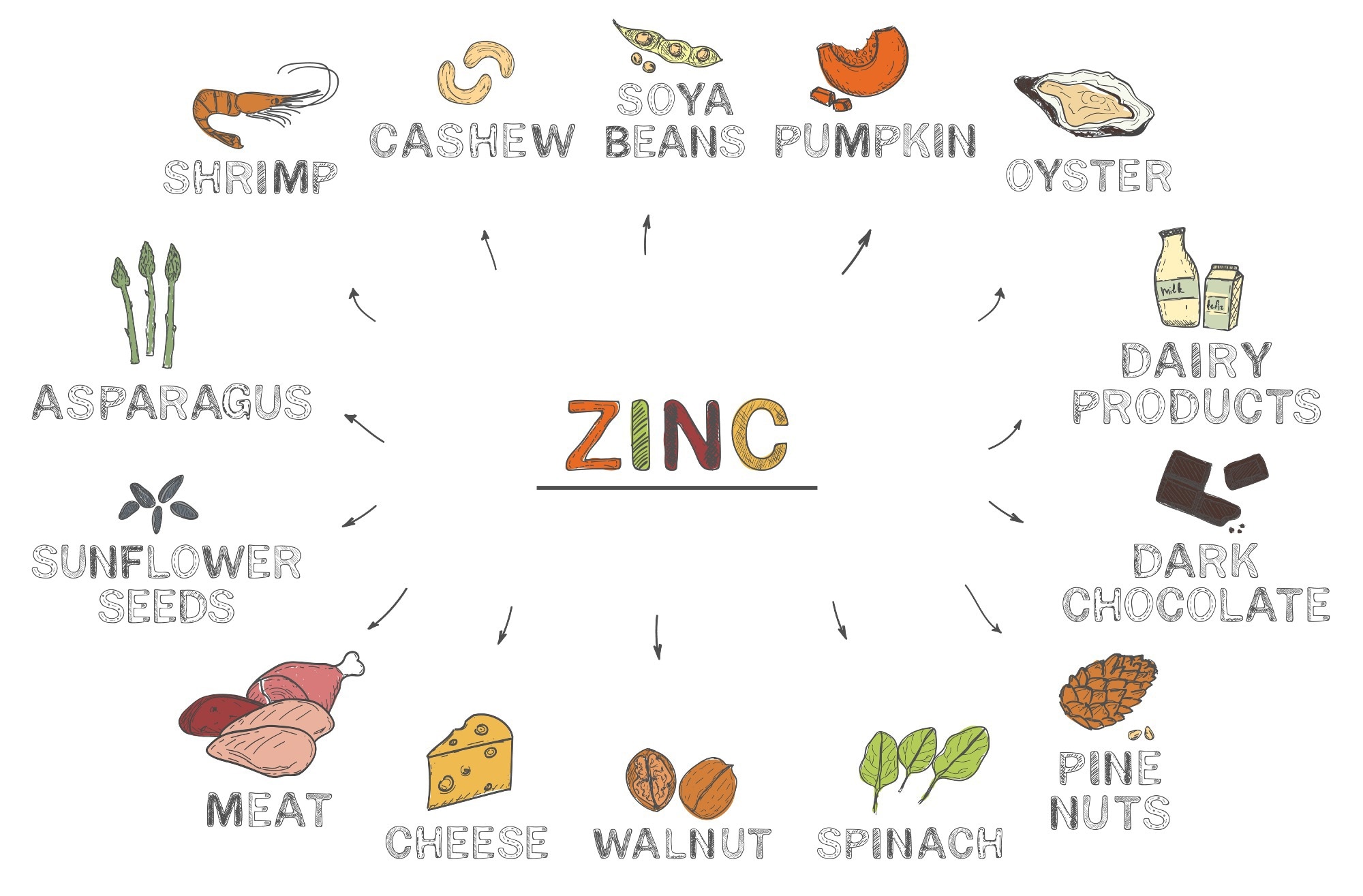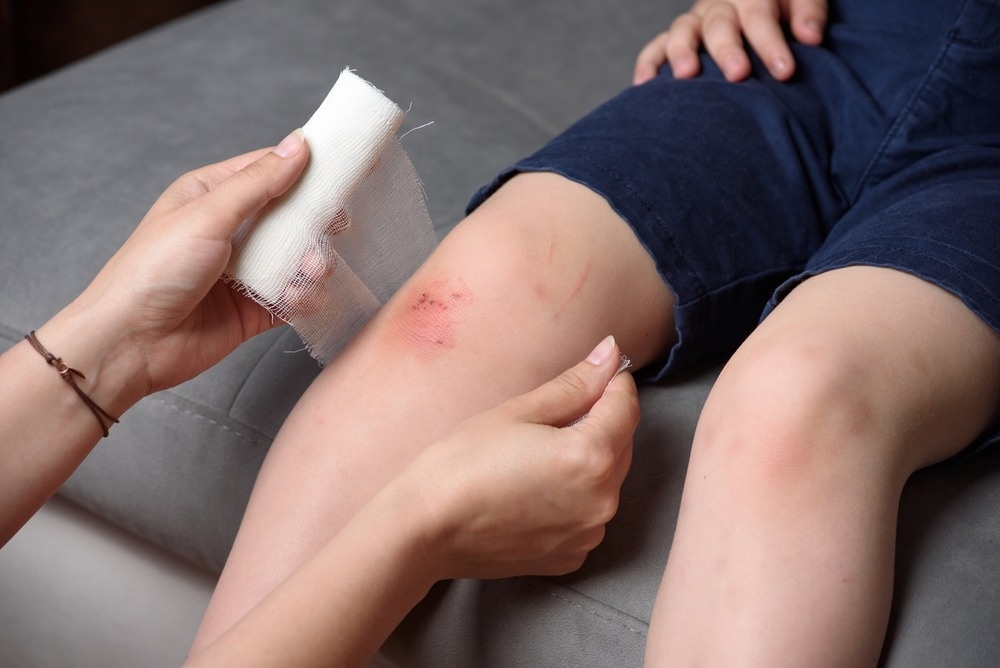What is zinc?
Zinc and immune health
Zinc and wound healing
References
Further reading
What is zinc?
Zinc is an essential mineral required for a wide range of cellular metabolic activities. It plays vital roles in regulating the catabolic activities of several enzymes and increasing immune functions, wound healing, protein and DNA synthesis, and cell signaling and division. 1
Zinc is found naturally in some foods (meat, fish, and seafood) and is also available as a dietary supplement. Some over-the-counter medicines for cold and denture adhesive creams also contain this essential mineral. 1

Image Credit: Mila_ls/Shutterstock.com
Estimation of zinc levels in serum or plasma is generally considered in clinical setups to determine the body’s zinc status. The normal physiological level of zinc in human serum or plasma is 80 to 120 mcg/dL. Zinc deficiency is characterized by a zinc level of below 70 mcg/dL in women and 74 mcg/dL in men. 1
Zinc and immune health
Zinc is essential for normal development and functioning of immune cells, including T cells, B cells, neutrophils, macrophages, and natural killer (NK) cells. Zinc deficiency can potentially increase the risk of infections and cause severe immune dysfunctions. 2
Zinc plays a vital role in regulating cytokine production and suppressing inflammation. The broad-spectrum antioxidant properties of zinc are responsible for inhibiting reactive oxygen species (ROS) production and preventing oxidative damage to cellular macromolecules. 3
How does Stress Affect Your Immune System?
Zinc, in its positively charged ionic form, acts as a chemo-attractant to channel pathogens for phagocytosis and subsequently destroy them through the production of ROS. 4 Zinc can inhibit the uptake of manganese by Streptococcus pneumoniae through competitive binding, which subsequently impairs the bacteria’s ability to invade and infect host cells. 5
Zinc acts as a catalyst, structural component, or regulatory ion in a range of immune processes. It boosts the immune system by increasing the activities of both innate immune cells (neutrophils and NK cells) and adaptive immune cells (B cells and T cells). 6
Zinc plays a vital role in neutrophil development and activation. Zinc deficiency has been found to reduce neutrophil’s ability to destroy pathogens through ROS-mediated phagocytosis. Moreover, zinc supplementation has been found to reduce neutrophil recruitment and subsequently prevent lung injury. 6
Zinc plays a vital role in NK cell development, maturation, and function. Zinc supplementation has been found to induce the differentiation of CD34+ cells into NK cells and increase the cytotoxic functions of NK cells. 6
Importance of Zinc for the Immune System
Regarding adaptive immune cells, a positive association has been observed between intracellular zinc level and activation and proliferation of B cells. Zinc deficiency has been found to affect the development of immature and pre-mature B cells and subsequent antibody production. 7
Zinc impacts the growth and functions of T cells. It regulates the activation of mature T cells by interacting with protein kinase C and lymphocyte protein tyrosine kinase. Zinc deficiency during T cell maturation has been found to increase pre-T cell apoptosis.6
A reduction in zinc level can lead to thymus atrophy and T cell lymphopenia.8 A reduced zinc level has been found to be associated with decreased type 1 to type 2 T-helper cell ratio, reduced interferon-gamma production, and compromised T-cell-mediated immune response 10. Zinc supplementation, on the other hand, has been found to increase cellular and humoral immunity and reduce chronic inflammation.10
Zinc ion acts as a second messenger to modulate various immune signaling pathways. It induces monocytes to produce pro-inflammatory cytokines that are vital for the regulation of immune and inflammatory responses to infections.11
Zinc increases the production of interleukin 2 (IL-2) by T cells, which is required for the growth, proliferation, and differentiation of naïve T cells into effector T cells. Zinc supplementation has been found to restore the balance between type 1 and type 2 T-helper cells by modulating cytokine production.6
Zinc and wound healing
Wound healing is a natural physiological response to tissue injury. It is important for restoring the protective epithelial barrier and regaining tissue volume and strength.12
Wound healing is closely related to inflammatory and immune responses. Zinc plays an important role in wound healing through its immunomodulatory functions. Zinc deficiency has been found to cause a delay in the wound healing process.15

Image Credit: Penyushkina/Shutterstock.com
Beneficial health effects of zinc supplementation have been observed in critically ill patients, severe burn injuries, subcutaneous abscesses, minor surgery, and pressure ulcer.15
Zinc plays a vital role in each phase of the wound healing process. The most prominent functions of zinc during wound healing include bacterial clearance, tissue necrosis, resolution of inflammation, removal of tissue debris, fibroblasts and keratinocyte influx and subsequent re-epithelization, angiogenesis, and stem cell activation, and remodeling of extracellular matrix.15
Zinc supplementation in individuals with zinc deficiency has shown beneficial effects on wound healing. However, studies investigating the impact of zinc supplementation on wound healing in patients without zinc deficiency have produced mixed results.15
Widespread use of topical zinc sulfate formulations has been observed in wound care for its antioxidant effects.16 The use of highly insoluble zinc oxide has been observed in wound care because of its ability to supply zinc to wounds for a prolonged period and to increase collagen degradation in necrotic wounds.15
Daily dietary zinc supplementation is routine in severe burn care.17 Zinc oxide nanoparticles have received considerable attention for wound healing in recent years because of their effective cell penetration, immunomodulation, and antimicrobial capacity.18
References
1. Office of Dietary Supplements - Zinc. Accessed June 24, 2024. https://ods.od.nih.gov/factsheets/Zinc-HealthProfessional/
2. Prasad AS. Zinc in Human Health: Effect of Zinc on Immune Cells. Mol Med. 2008;14(5-6):353-357. doi:10.2119/2008-00033.Prasad https://pubmed.ncbi.nlm.nih.gov/18385818/
3. Prasad AS. Clinical, immunological, anti-inflammatory and antioxidant roles of zinc. Exp Gerontol. 2008;43(5):370-377. doi:10.1016/j.exger.2007.10.013 https://pubmed.ncbi.nlm.nih.gov/18054190/
4. Shen C, James SA, de Jonge MD, Turney TW, Wright PFA, Feltis BN. Relating Cytotoxicity, Zinc Ions, and Reactive Oxygen in ZnO Nanoparticle–Exposed Human Immune Cells. Toxicol Sci. 2013;136(1):120-130. doi:10.1093/toxsci/kft187
5. Eijkelkamp BA, Morey JR, Ween MP, et al. Extracellular Zinc Competitively Inhibits Manganese Uptake and Compromises Oxidative Stress Management in Streptococcus pneumoniae. PLOS ONE. 2014;9(2):e89427. doi:10.1371/journal.pone.0089427
6. Jin D, Wei X, He Y, et al. The nutritional roles of zinc for immune system and COVID-19 patients. Front Nutr. 2024;11. doi:10.3389/fnut.2024.1385591
7. Ollig J, Kloubert V, Taylor KM, Rink L. B cell activation and proliferation increase intracellular zinc levels. J Nutr Biochem. 2019;64:72-79. doi:10.1016/j.jnutbio.2018.10.008
8. Perkey E, Maillard I. Zinc: a damage signal promoting thymic repair. Blood. 2022;139(25):3569-3570. doi:10.1182/blood.2022016333
9. Metz CHD, Schröder AK, Overbeck S, Kahmann L, Plümäkers B, Rink L. T-helper type 1 cytokine release is enhanced by in vitro zinc supplementation due to increased natural killer cells. Nutrition. 2007;23(2):157-163. doi:10.1016/j.nut.2006.10.007
10. Haase H, Rink L. The immune system and the impact of zinc during aging. Immun Ageing. 2009;6(1):9. doi:10.1186/1742-4933-6-9
11. Bao B, Prasad AS, Beck FWJ, Godmere M. Zinc modulates mRNA levels of cytokines. Am J Physiol-Endocrinol Metab. 2003;285(5):E1095-E1102. doi:10.1152/ajpendo.00545.2002
12. Grubbs H, Manna B. Wound Physiology. In: StatPearls. StatPearls Publishing; 2024. Accessed June 27, 2024. http://www.ncbi.nlm.nih.gov/books/NBK518964/
13. Lin PH, Sermersheim M, Li H, Lee PHU, Steinberg SM, Ma J. Zinc in Wound Healing Modulation. Nutrients. 2017;10(1):16. doi:10.3390/nu10010016
14. Rostan EF, DeBuys HV, Madey DL, Pinnell SR. Evidence supporting zinc as an important antioxidant for skin. Int J Dermatol. 2002;41(9):606-611. doi:10.1046/j.1365-4362.2002.01567.x
15. Adjepong M, Agbenorku P, Brown P, Oduro I. The role of antioxidant micronutrients in the rate of recovery of burn patients: a systematic review. Burns Trauma. 2016;4:18. doi:10.1186/s41038-016-0044-x
16. Oyarzun-Ampuero F, Vidal A, Concha M, Morales J, Orellana S, Moreno-Villoslada I. Nanoparticles for the Treatment of Wounds. Curr Pharm Des. 2015;21(29):4329-4341. doi:10.2174/1381612821666150901104601
Further Reading
Last Updated: Jul 18, 2024